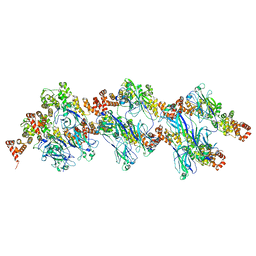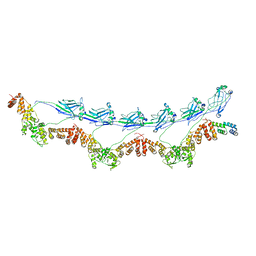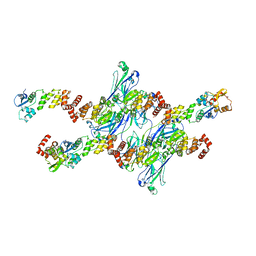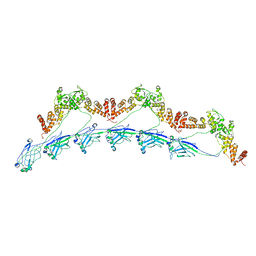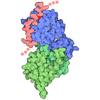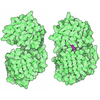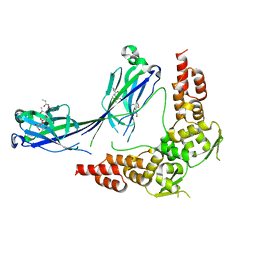+ データを開く
データを開く
- 基本情報
基本情報
| 登録情報 |  | |||||||||
|---|---|---|---|---|---|---|---|---|---|---|
| タイトル | SPOP W22R Tetrameric Form | |||||||||
 マップデータ マップデータ | Full map | |||||||||
 試料 試料 |
| |||||||||
 キーワード キーワード | SPOP / ubiquitination / cullin / ONCOPROTEIN | |||||||||
| 機能・相同性 |  機能・相同性情報 機能・相同性情報molecular function inhibitor activity / Cul3-RING ubiquitin ligase complex / regulation of proteolysis / Hedgehog 'on' state / protein polyubiquitination / proteasome-mediated ubiquitin-dependent protein catabolic process / nuclear speck / ubiquitin protein ligase binding / nucleoplasm / identical protein binding ...molecular function inhibitor activity / Cul3-RING ubiquitin ligase complex / regulation of proteolysis / Hedgehog 'on' state / protein polyubiquitination / proteasome-mediated ubiquitin-dependent protein catabolic process / nuclear speck / ubiquitin protein ligase binding / nucleoplasm / identical protein binding / nucleus / cytoplasm 類似検索 - 分子機能 | |||||||||
| 生物種 |  Homo sapiens (ヒト) Homo sapiens (ヒト) | |||||||||
| 手法 | 単粒子再構成法 / クライオ電子顕微鏡法 / 解像度: 6.2 Å | |||||||||
 データ登録者 データ登録者 | Cuneo MJ / Mittag T / O'Flynn B / Lo YH | |||||||||
| 資金援助 |  米国, 1件 米国, 1件
| |||||||||
 引用 引用 |  ジャーナル: Mol.Cell / 年: 2023 ジャーナル: Mol.Cell / 年: 2023タイトル: Higher-order SPOP assembly reveals a basis for cancer mutant dysregulation. 著者: Cuneo MJ / O'Flynn BG / Lo YH / Sabri N / Mittag T | |||||||||
| 履歴 |
|
- 構造の表示
構造の表示
- ダウンロードとリンク
ダウンロードとリンク
-EMDBアーカイブ
| マップデータ |  emd_27759.map.gz emd_27759.map.gz | 50.2 MB |  EMDBマップデータ形式 EMDBマップデータ形式 | |
|---|---|---|---|---|
| ヘッダ (付随情報) |  emd-27759-v30.xml emd-27759-v30.xml emd-27759.xml emd-27759.xml | 14.9 KB 14.9 KB | 表示 表示 |  EMDBヘッダ EMDBヘッダ |
| FSC (解像度算出) |  emd_27759_fsc.xml emd_27759_fsc.xml | 10 KB | 表示 |  FSCデータファイル FSCデータファイル |
| 画像 |  emd_27759.png emd_27759.png | 45.4 KB | ||
| マスクデータ |  emd_27759_msk_1.map emd_27759_msk_1.map | 103 MB |  マスクマップ マスクマップ | |
| Filedesc metadata |  emd-27759.cif.gz emd-27759.cif.gz | 5.5 KB | ||
| その他 |  emd_27759_half_map_1.map.gz emd_27759_half_map_1.map.gz emd_27759_half_map_2.map.gz emd_27759_half_map_2.map.gz | 95.7 MB 95.7 MB | ||
| アーカイブディレクトリ |  http://ftp.pdbj.org/pub/emdb/structures/EMD-27759 http://ftp.pdbj.org/pub/emdb/structures/EMD-27759 ftp://ftp.pdbj.org/pub/emdb/structures/EMD-27759 ftp://ftp.pdbj.org/pub/emdb/structures/EMD-27759 | HTTPS FTP |
-検証レポート
| 文書・要旨 |  emd_27759_validation.pdf.gz emd_27759_validation.pdf.gz | 760 KB | 表示 |  EMDB検証レポート EMDB検証レポート |
|---|---|---|---|---|
| 文書・詳細版 |  emd_27759_full_validation.pdf.gz emd_27759_full_validation.pdf.gz | 759.5 KB | 表示 | |
| XML形式データ |  emd_27759_validation.xml.gz emd_27759_validation.xml.gz | 18.4 KB | 表示 | |
| CIF形式データ |  emd_27759_validation.cif.gz emd_27759_validation.cif.gz | 23.7 KB | 表示 | |
| アーカイブディレクトリ |  https://ftp.pdbj.org/pub/emdb/validation_reports/EMD-27759 https://ftp.pdbj.org/pub/emdb/validation_reports/EMD-27759 ftp://ftp.pdbj.org/pub/emdb/validation_reports/EMD-27759 ftp://ftp.pdbj.org/pub/emdb/validation_reports/EMD-27759 | HTTPS FTP |
-関連構造データ
- リンク
リンク
| EMDBのページ |  EMDB (EBI/PDBe) / EMDB (EBI/PDBe) /  EMDataResource EMDataResource |
|---|---|
| 「今月の分子」の関連する項目 |
- マップ
マップ
| ファイル |  ダウンロード / ファイル: emd_27759.map.gz / 形式: CCP4 / 大きさ: 103 MB / タイプ: IMAGE STORED AS FLOATING POINT NUMBER (4 BYTES) ダウンロード / ファイル: emd_27759.map.gz / 形式: CCP4 / 大きさ: 103 MB / タイプ: IMAGE STORED AS FLOATING POINT NUMBER (4 BYTES) | ||||||||||||||||||||
|---|---|---|---|---|---|---|---|---|---|---|---|---|---|---|---|---|---|---|---|---|---|
| 注釈 | Full map | ||||||||||||||||||||
| ボクセルのサイズ | X=Y=Z: 1.4526 Å | ||||||||||||||||||||
| 密度 |
| ||||||||||||||||||||
| 対称性 | 空間群: 1 | ||||||||||||||||||||
| 詳細 | EMDB XML:
|
-添付データ
- 試料の構成要素
試料の構成要素
-全体 : SPOP W22R Mutant (tetrameric form)
| 全体 | 名称: SPOP W22R Mutant (tetrameric form) |
|---|---|
| 要素 |
|
-超分子 #1: SPOP W22R Mutant (tetrameric form)
| 超分子 | 名称: SPOP W22R Mutant (tetrameric form) / タイプ: complex / ID: 1 / 親要素: 0 / 含まれる分子: all |
|---|---|
| 由来(天然) | 生物種:  Homo sapiens (ヒト) Homo sapiens (ヒト) |
-分子 #1: Speckle-type POZ protein
| 分子 | 名称: Speckle-type POZ protein / タイプ: protein_or_peptide / ID: 1 / コピー数: 12 / 光学異性体: LEVO |
|---|---|
| 由来(天然) | 生物種:  Homo sapiens (ヒト) Homo sapiens (ヒト) |
| 分子量 | 理論値: 42.023148 KDa |
| 組換発現 | 生物種:  |
| 配列 | 文字列: SRVPSPPPPA EMSSGPVAES RCYTQIKVVK FSYMWTINNF SFCREEMGEV IKSSTFSSGA NDKLKWCLRV NPKGLDEESK DYLSLYLLL VSCPKSEVRA KFKFSILNAK GEETKAMESQ RAYRFVQGKD WGFKKFIRRD FLLDEANGLL PDDKLTLFCE V SVVQDSVN ...文字列: SRVPSPPPPA EMSSGPVAES RCYTQIKVVK FSYMWTINNF SFCREEMGEV IKSSTFSSGA NDKLKWCLRV NPKGLDEESK DYLSLYLLL VSCPKSEVRA KFKFSILNAK GEETKAMESQ RAYRFVQGKD WGFKKFIRRD FLLDEANGLL PDDKLTLFCE V SVVQDSVN ISGQNTMNMV KVPECRLADE LGGLWENSRF TDCCLCVAGQ EFQAHKAILA ARSPVFSAMF EHEMEESKKN RV EINDVEP EVFKEMMCFI YTGKAPNLDK MADDLLAAAD KYALERLKVM CEDALCSNLS VENAAEILIL ADLHSADQLK TQA VDFINY HASDVLETSG WKSMVVSHPH LVAEAYRSLA SAQCPFLGPP RKRLKQS UniProtKB: Speckle-type POZ protein |
-実験情報
-構造解析
| 手法 | クライオ電子顕微鏡法 |
|---|---|
 解析 解析 | 単粒子再構成法 |
| 試料の集合状態 | filament |
- 試料調製
試料調製
| 濃度 | 1 mg/mL |
|---|---|
| 緩衝液 | pH: 7.5 / 詳細: 20 mM HEPES pH 7.5, 400 mM NaCl, 5 mM DTT |
| 凍結 | 凍結剤: ETHANE / チャンバー内湿度: 100 % / 装置: FEI VITROBOT MARK III |
- 電子顕微鏡法
電子顕微鏡法
| 顕微鏡 | FEI TITAN KRIOS |
|---|---|
| 撮影 | フィルム・検出器のモデル: GATAN K3 (6k x 4k) / 平均電子線量: 69.2 e/Å2 |
| 電子線 | 加速電圧: 300 kV / 電子線源:  FIELD EMISSION GUN FIELD EMISSION GUN |
| 電子光学系 | 照射モード: OTHER / 撮影モード: BRIGHT FIELD / 最大 デフォーカス(公称値): 1.8 µm / 最小 デフォーカス(公称値): 0.6 µm |
| 試料ステージ | 試料ホルダーモデル: FEI TITAN KRIOS AUTOGRID HOLDER ホルダー冷却材: NITROGEN |
| 実験機器 |  モデル: Titan Krios / 画像提供: FEI Company |
- 画像解析
画像解析
| 初期モデル | モデルのタイプ: PDB ENTRY PDBモデル - PDB ID: |
|---|---|
| 最終 再構成 | 解像度のタイプ: BY AUTHOR / 解像度: 6.2 Å / 解像度の算出法: FSC 0.143 CUT-OFF / ソフトウェア - 名称: cryoSPARC / 使用した粒子像数: 121000 |
| 初期 角度割当 | タイプ: MAXIMUM LIKELIHOOD |
| 最終 角度割当 | タイプ: MAXIMUM LIKELIHOOD |
 ムービー
ムービー コントローラー
コントローラー



